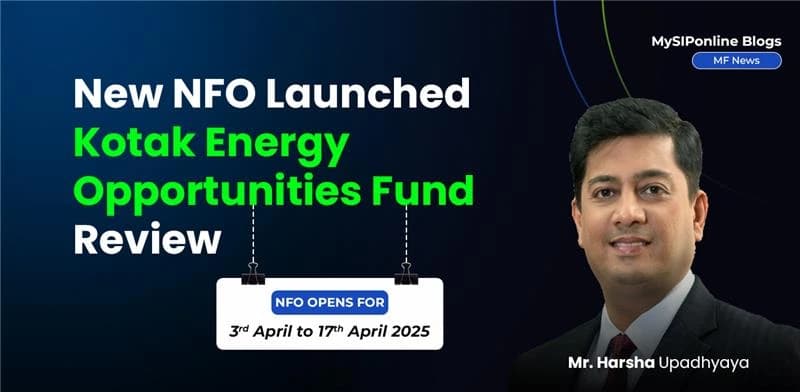Table of Contents
Have you ever come across the term NFO and wondered what is NFO full form, what NFO means in mutual funds, or if it is good to invest in an NFO?
If yes, this analysis gives you a complete guide on the topic and it draws a comparison between NFO vs Mutual Funds to find out which is a better investment opportunity for you in 2025.
What Does NFO Means?
In market terms, NFO full form means a New Fund Offer, which is the first subscription offered by any Asset Management Company to announce their newly launched scheme in the mutual funds industry.
Now that you understand what a NFO means, cover the eligibility to invest in a new fund offer in the next section.
New Fund Offer Eligibility India
You can easily invest in NFO online and for that, you must meet the following eligibility criteria:
| Requirement | How to Fulfil |
|---|---|
| KYC Compliance | Complete KYC by providing ID proof and address. |
| Resident Status | Open to Indian residents and NRIs/PIOs with specific terms. |
| Age and Legal Capacity | Must be 18 or older and legally able to invest. |
| Minimum Investment Amount | There’s a minimum investment amount for each NFO. |
Now that you learned the NFO full form and eligibility to invest in a new fund offer, let’s see how it works in India.
Start Your SIP TodayLet your money work for you with the best SIP plans.
How NFO Work in India?
Here is how a new fund offer works in Mutual Funds, a complete guide for beginners:
-
Fund Launch and Pricing
A new mutual fund is created by the Asset Management Company (AMC) with a clear investment plan (like equity, debt or hybrid). During the NFO (New Fund Offer), units are sold at a fixed price, usually Rs.10 per unit. This price stays the same throughout the offer period, so market changes do not affect it.
-
Subscription Period
The NFO is open for a set period, typically 2 weeks. During this time, you can buy units of the fund. You can apply online or offline through the AMC’s website, mutual fund platforms or registered brokers.
-
Allotment of Units
After the subscription period ends, the AMC allocates units to investors as per their demands. If there is a high demand, AMCs might adjust the number of units available or even conduct a lottery to distribute them fairly.
-
Post-NFO Trading
Once the NFO ends, units are credited to your account. For open-ended funds, you can buy or sell units at the current price (NAV or net asset value) on the exchange. For closed-ended funds, the units are listed after a lock-in period, allowing you to trade them on the stock exchange.
This is how an NFO works, giving you a smart way to invest in a new mutual fund at a fixed price before it starts trading publicly.
Must Read: Top Reasons to Invest in a NFO 2025
How to Invest in a New Fund Offer 2025?
Investing in an NFO is simple! Just follow these steps:
-
Complete Your KYC
Before you invest, make sure your KYC (Know Your Customer) process is complete. If it’s not, your application will not be accepted.
-
Offline Investment
Fill out the physical application form.Submit it along with your documents either through a broker or at the AMC (Asset Management Company) office.
-
Online Investment
Log in to your online trading account or the AMC’s website.
Choose the NFO you want to invest in, select your units and make the payment.
-
Confirmation and Allotment
Once your application is approved, the fund units will be credited to your account in a few days.
How Investing in Best NFO Benefits Your Portfolio?
The following points offer merits showing why it is good to invest in NFO 2025:
-
Early Investment Opportunity
By investing in an NFO, you are able to get in before the fund becomes popular. This gives you a chance to benefit from its growth while it’s still new and growing.
-
Affordable Entry
Most new fund offers have a fixed price (usually Rs.10 per unit), making it easier for new investors to start. You know exactly how much you will pay during the offer period.
-
Distributes Money & Lowers Risk
NFOs can help you spread your money across different sectors or industries, such as technology, healthcare or agriculture. This reliability minimizes risk and increases profit margins.
-
Chance for Good Returns
Equity-based NFOs can help you earn good returns if the market conditions and the fund’s strategy align with investment. The earlier you invest, the more you could potentially gain.
-
Tax Savings
Some NFOs, especially equity ones, offer tax benefits. Hybrid and debt NFOs can provide regular income and usually have lower taxes on their fixed returns.
Investing in the best NFO can be a great way to grow your portfolio by giving you early access to new opportunities, low-cost entry and the potential for high returns while helping with tax savings.
NFO vs Mutual Fund: Which is Better?
Here is a side-by-side comparison between NFO and existing mutual funds to understand which the better investment option is:
| Particulars | NFO | Mutual Funds |
|---|---|---|
| Meaning | Newly launched scheme by AMCs | Existing fund with a current portfolio |
| Purpose | To raise money for a new fund offer | To collect money for asset management |
| Investment Duration | Limited NFO period | Anytime investment available |
| Cost | Fixed during the NFO period | Depends on market value |
| Performance Track | No historical data is available | Can track the past performance of the fund |
| Investor Knowledge | Limited information | Detailed information available |
| Risk | High risk due to uncertainty | Moderate risk, recovery data available |
As promised, here are the latest upcoming new fund offers just for you.
Smart Investments, Bigger Returns
Is it Good to Invest in a NFO (New Fund Offer)?
Here is a table below that enlightens you about the pros and cons of investing in a new fund offer:
Pros of Investing in NFOs
The following are the advantages of investing in a NFO for you:
- Fresh Investment Theme: NFOs are often created to take advantage of new trends or opportunities in the market. This gives investors a chance to get involved in something new and potentially profitable from the start.
- Lower Initial Costs: NFO units are usually priced at a low value (often at Rs.10) during the subscription period, which allows you to invest less money compared to other existing funds.
- Potential for Early Gains: If you invest in an NFO early, there is a chance you could earn profits as the fund grows before it becomes widely known.
- Manager Expertise: an experienced mutual funds analyst who is trusted to make good investment decisions and manage a new fund offer. This adds confidence that your investment could be well-managed.
Cons of Investing in NFOs
Here are the disadvantages of investing in a new fund offer (NFO) in mutual funds:
- Lack of Track Record: NFOs are new, so there is no history of how the fund has performed in the past. This makes it harder to know if it is a safe investment or not.
- Uncertain Performance: Since the NFO is new, there is no guarantee of how well it will perform. It may not do well and it is harder to predict.
- Limited Information: NFOs do not always provide a lot of details when they are launched. This can make it tough to understand what you are investing in and whether it's a good choice.
- No Immediate Liquidity: You cannot buy or sell NFO units on the stock market until the fund is officially listed. This can be an issue if you need access to your money quickly.
- Possibility of Overpricing: After the NFO is listed, the market determines the price of the units. There's a chance that the price might be higher than what the assets are actually worth, making it a less good deal.
Time to wrap up this guide and share with you some free-handed advice on whether or not you can do SIP in NFO or existing funds.
To Conclude New Fund Offer
In short, after weighing the pros and cons of investing in a new fund offer, you could say it is more like shooting in the dark. Thus, you never know where the bullet will aim. However, there is no doubt that your blind bet can be extremely successful, but the risk of failure is also extremely high.
So, what can you do instead? Simply put, start by taking the SIP route, which will lower your risk and help you combat market uncertainty. Moreover, if you plan to invest in the existing mutual fund schemes, find the best mutual funds to invest in 2025 with just One Click.
Also Read These Mutual Funds Learning Blogs :
1. What is PE Ratio in Mutual Fund: Everything You Need to Know
2. What is XIRR? Meaning, Full Form and How It Works?










.webp&w=3840&q=75)


